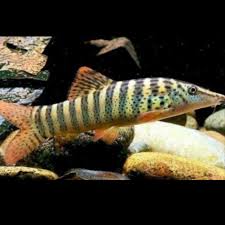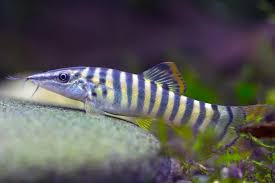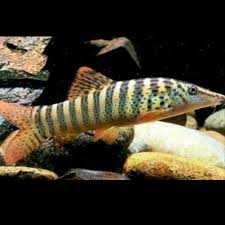Top Fin Aquatics
Green Tiger Botia Loach
Green Tiger Botia Loach
Couldn't load pickup availability
TopFin Aquatics Species Profile: Tiger Loach (Syncrossus hymenophysa)
Commonly known as the Green Tiger Loach, Zebra Loach, Tiger Botia, or Banded Loach, the Tiger Loach is a striking and rare freshwater species admired for its bold appearance, scavenging habits, and unique group behaviour.
Natural Habitat
-
Origin: Native to fast-moving mountain streams and large river systems in Peninsular Malaysia, Borneo, and Sumatra.
-
Environment: Prefers soft substrates, often found near submerged boulders, driftwood, and fallen trees where they can hide and forage.
Physical Characteristics
-
Size: Can grow up to 21 cm (9 inches) in length.
-
Appearance: Features a brownish-tan body marked with 12 to 15 vertical bars, each edged in a greenish-blue iridescence. These stripes begin at the base of the dorsal fin and continue downward toward the head.
Behaviour and Compatibility
-
Temperament: More aggressive than most loaches, particularly during feeding times.
-
Best Kept in Groups: A group of 8 or more helps establish a stable social hierarchy and minimises aggression.
-
Tank Mate Warning: Not suitable for aquariums with Cichlids, long-finned fish, or other peaceful community species.
-
Escape Risk: Known to be excellent jumpers, so a tightly fitting aquarium lid is essential.
Tank Requirements
-
Tank Size: Requires a large, well-oxygenated aquarium with ample swimming space.
-
Aquascaping: Provide plenty of hiding spots using rocks, driftwood, and dense planting. Visual barriers help reduce territorial disputes.
-
Lighting: Prefers low to moderate lighting.
-
Water Parameters:
-
Temperature: 25–30°C (77–86°F)
-
pH: 6.5–7.5
-
-
Filtration: A strong filter and regular partial water changes are crucial for maintaining water quality.
-
Feeding: Carnivorous diet including live or frozen foods, sinking pellets, catfish granules, and high-quality flakes.
Breeding and Behaviour Notes
-
Social Structure: In groups, Tiger Loaches establish a complex social hierarchy and become more active and interesting to observe.
-
Breeding in the Wild: During the rainy season, they migrate into flooded forest areas to spawn, typically around submerged tree roots or debris.
-
Captive Breeding: Rarely bred in home aquariums due to their migratory breeding habits and environmental requirements.
Share




